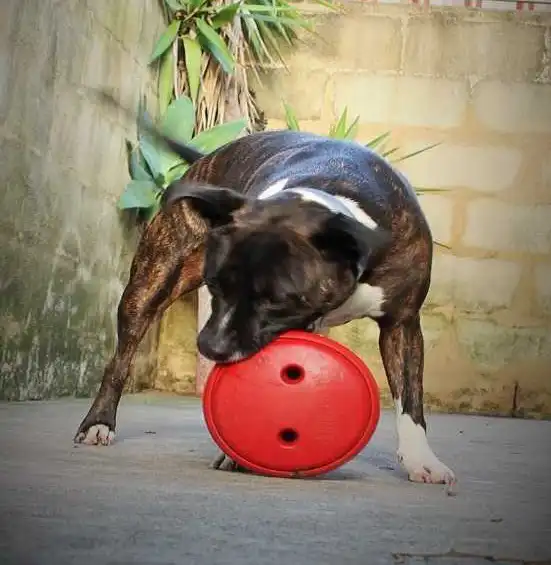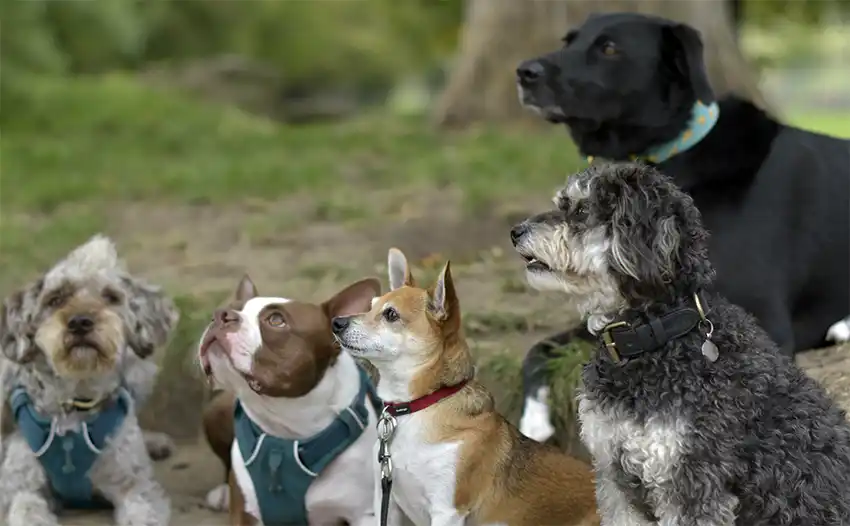The Boston Terrier is a compact, sturdy, people-oriented dog with a lively disposition. The first native American breed to be recognised by the Australian National Kennel Club and is immediately recognisable for its “tuxedo” coats (earning it the nickname “The American Gentleman”) and expressive eyes. These well-dressed dogs haven’t just earned their popularity with their fashion sense: they are intelligence-filled, always-alert natural comedians that tend to bring smiles to their owners’ faces.
Boston Terrier Training
Boston Terriers typically have a stable temperament that enables them to get along well with both animals and humans. While they are not a breed that Bark Busters® receive a lot of calls for help with, one common issue seems to present itself, which is separation anxiety. Our Boston Terrier Training programs are designed to address these issues in a gentle, effective way.
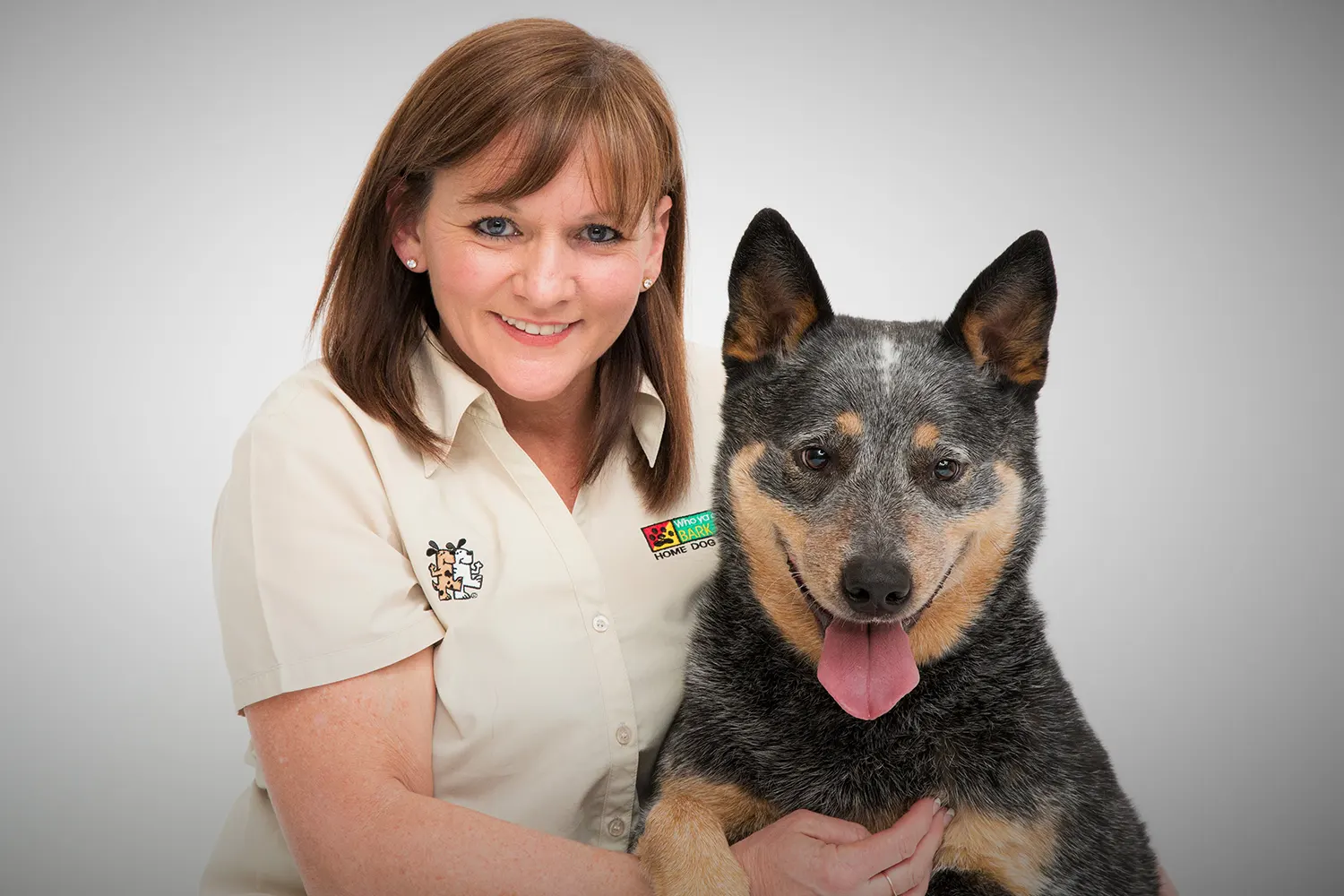 Donna Ryan - Bark Busters International Head of Training
Donna Ryan - Bark Busters International Head of Training
To understand separation anxiety, we must first understand how dogs think. Dogs are hardwired with a pack mentality. The corresponding hierarchy is determined using subtle, passive methods. We sometimes forget or are unaware of it, but we humans are included in the pack! The pack member who has the greatest influence on the behaviour of others is the leader, and Boston Terriers can become leaders of their human pack quite easily – their likeability and silly antics mean they are often given leeway by their owners that they interpret as an acknowledgement of their leadership. Effective Boston Terrier Training focuses on helping owners establish clear leadership in a kind, consistent way.
Dogs display what they believe to be leadership behaviour – often perceived as annoying or frustrating by humans – when they have determined they are in charge. This behaviour can be situational and might include barking at people or dogs passing outside, rushing the door when someone comes to visit, and even becoming destructive when humans are away. Separation anxiety is an outgrowth of leadership – dogs get upset when the subordinates in their pack leave because, in their mind, they are responsible for “taking care” of them. Bostons become worried, that worry can be expressed by barking, destructive behaviour, or toileting accidents. Boston Terrier Training techniques can help redirect this energy and teach the dog to feel secure even when left alone.
Toby was one such Boston Terrier. He lives with his owner, Becky, in an apartment with thin walls. Toby would bark until exhausted as soon as Becky left for work each day – any noise he heard would set him off again, and the behaviour would continue throughout the day. Constant barking meant plenty of neighbour complaints, so Becky called Bark Busters® – after all, it’s our name!
Our trainer quickly observed the dynamics of the relationship and coached Becky on how to reassert her dominance as leader of the pack. Progress came quickly, and regular corrections meant it wasn’t very long before Toby was able to relax and nap until Becky got home.
If you have a Boston Terrier and need assistance resolving behavioural issues, call your local Bark Busters® trainer. The sooner you get help, the sooner you and your dog can enjoy a happy, relaxed relationship built on loyalty, love, and respect – not worry or stress. Professional Boston Terrier Training can make all the difference in creating a calm, confident, and well-behaved dog.
Physical Characteristics
Boston Terriers are compact, well-balanced dogs with smooth, "tuxedo" coats, and short heads and tails. Their trademark eyes are expressive and prominent, and their head tilt when investigating something new is as well-loved as their happy, sure-footed gait.
These medium sized dogs come in a variety of colours:
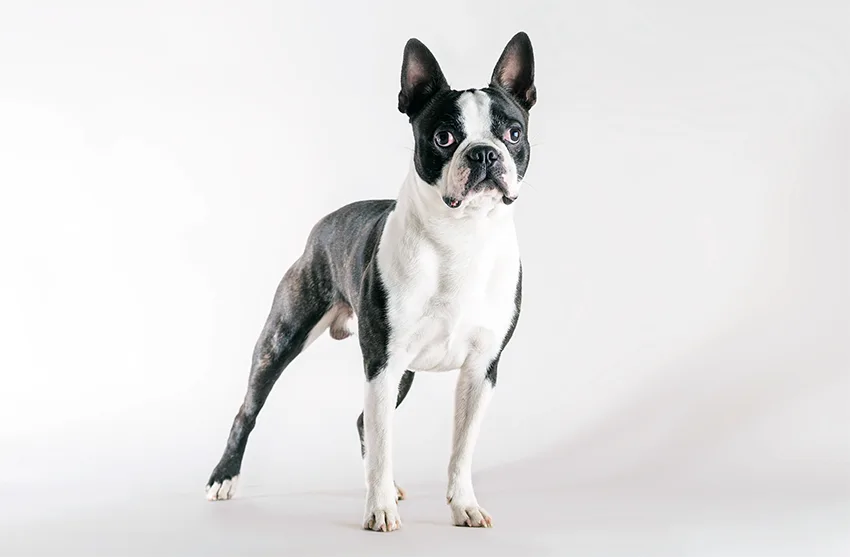
History
Boston Terriers originated in Boston in the late 1800s by crossing English Bulldogs and white English Terriers. They are often referred to as the national dog of the United States being one of the few truly all-American breeds.
Boston Terriers have been known by a variety of names such as Boston Bulls and American Bull Terriers, but Bulldog and Bull Terrier owners objected so, in 1891, they officially become known as the Boston Terrier.
Other nicknames through the years have been roundheads, bostons and, due to their lovely nature, the "American gentlemen" of dogs.
Boston Terriers were a common dog breed prior to the 1960s and then their popularity seemed to decline. Recently, due to their use in several television commercials, there has been renewed interest in the breed.
Personality and Temperament
Boston Terriers possess loving, friendly personalities that easily wins hearts. Their very stable temperaments are excellent for first-time dog owners and seasoned veterans alike, as well as families with children. Highly sociable, intelligent, and entertaining, Boston Terriers are very trainable – especially early in life.
Grooming
While Boston Terriers shed infrequently, they do benefit from weekly brushings to remove hair from their sleek, fine coats. Occasional baths are recommended as well as regular nail trimmings to prevent movement issues and pain.
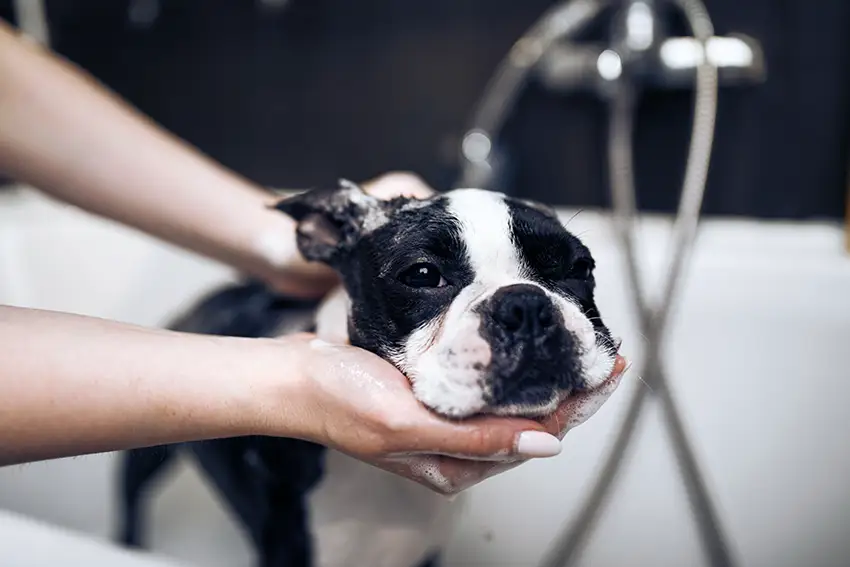
Health
Everyday Illnesses and Injuries
Your Boston Terrier’s health concerns will change over the course of their life. A puppy might be more prone to eat something they shouldn’t, a 2-year-old terrier may be more likely to develop allergies, and a senior terrior is far more likely to develop arthritis as they age. Terriers also have personality and physical traits that may make them more prone to certain conditions - an active Boston Terrier that loves to run around the yard may be more prone to rupturing their knee ligament.

If you are ever concerned about your dog’s health, your local veterinarian is a great resource.
Like many popular breeds, the Boston Terrier has its fair share of hereditary based issues, such as breathing problems. Most reputable breeders now have their breeding stock checked and scored by a vet for these hereditary ailments. You can request proof that the puppy you are purchasing comes from parents that have been checked for these issues.
Many other health issues are also hereditary, so we recommend you do some research on the ancestry of your puppy and any health issues of that particular breed.
Preparing Yourself
As a pet owner, you should expect to pay for basic veterinary care like vaccines, spay / neuter, and annual checkups. Many pet owners don’t consider the unexpected illnesses and injuries that can occur throughout a pet’s life and fail to prepare for them. Medical insurance can help a pet owner prepare and lessen unexpected bill in later life. As with most insurance you pay a monthly premium to be covered for eligible veterinary expenses. Every provider is different, offering varied coverage with different plans, pricing options and limitations. As you do your research, pay close attention to coverage, deductible options, ease of use, and if pre-existing conditions are covered.
Toilet Training
There are definite times when your puppy will need to toilet. Here we identify six critical times.
- Immediately after eating or drinking
- When they first wake up in the morning
- After exuberant play
- When woken during the night, such as the phone rings or you get up to use the bathroom.
- When you arrive home and your dog greets you
- If they get frightened or scared by something or someone
Take your puppy to a designated toilet area. Grass or dirt is best as we don’t want them associating their toilet with anything related to carpet or floors in general.
Toilet Training Aids
If you need to leave your puppy or dog for any length of time, it might be wise to provide an indoor toilet that you can eventually transition to the outdoors. Artificial grass products can be good and one that we would recommend if you can setup an indoor toileting area.
Puppy Selection
If selecting your Boston Terrier puppy from a breeder, ensure you view both parents to determine the type of personality your puppy might grow up to have.
Don’t concern yourself too much if one of the parents is the type of dog that barks on your approach to the property, providing they are friendly once you have gained access.
Check out the hereditary history of the parents. Check whether any of the parents or grandparents had any genetic diseases. Check our health checks in this section.
Puppies inherit a lot from their parents and ancestors, including their personality, their genetics, and their characteristics and personality. If you spot a parent that has some signs of serious aggression or fear issues, this dog is more likely to produce offspring that will inherit some or all those traits.
Puppies also learn a lot from their parents in their environment, especially when they are with their mother. She guides their behaviour in the early weeks. If she is tolerant and outgoing, then the puppies will usually be the same. If they encounter kind and gentle humans, then they will be accustomed to humans and will feel good about them.
The right type of early puppy education from its mother and siblings is an important factor towards how well-adjusted your puppy will be and how it will behave in the future. For this reason, it is not wise to take possession of your puppy until at least 8 weeks of age, but 12 weeks is preferable. Experienced breeders will want to adhere to this as they know that the puppy gains a lot of education if it is allowed to stay in that environment a little longer.
Be wary of anyone who says that you can take your puppy away at the age of 4 to 5 weeks or you cannot see the parents. Your puppy is missing out on vital education from its mother, which will affect its behaviour in the future.

Select the puppy that suits your personality and lifestyle
When selecting a puppy, be sure to select the personality of puppy that suits your lifestyle.
You will need to give thought to the amount of time you have to devote to your puppy. Ensure that that you have the room needed to accommodate a lively breed and that you are confident in educating such an energetic breed of dog.
Think carefully about the amount of time that your new dog or puppy will have to spend alone. The Boston Terrier is not great on being left alone for long periods of time. You might need to budget for a dog walker or consider a doggy daycare.
Should We Adopt One Puppy or Two?
Bark Busters offer lots of advice to new dog and puppy parents and we have a huge resource of information on the needs of dogs, how to best manage them, and what works.
New dog parents often ask us whether they should adopt one or two puppies. Our answer is always the same. Only adopt two if you actually want two puppies.
Their concern is that their dog will be lonely when left alone and they are out at work of rover 8 hours. We have all seen the animated film 'The Secret Life of Pets’ and what dogs get up to when left alone. Although fiction, many of the things they depicted in that movie were based on fact.
Dogs do suffer separation anxiety and resort to, destructive behaviours such as chewing furniture, counter surfing and raiding the bin when left to their own devices. Not to mention 8 hours is a long time when you need to go to the toilet.
In that movie, one of the pet parents brought home another dog for her "Home Alone" dog and initially they did not hit it off. This again is based on fact because truthfully some dogs don’t. Even dogs from the same litter can suffer from sibling rivalry.
All puppies are adaptable if given the right environment and education in which to thrive. They soon look upon you as part of their pack, a two-legged dog, and they can fit right into that social structure with ease.
Some folks find it hard to fathom that a dog might look at them as they would another dog. However, many people will think of their dog as a little four-legged human!
A puppy and a kitten are a good option if you are not looking to add another addition to your family unit. However, if you are introducing a kitten to an older dog, this needs to be done with great care. If the puppy and kitten join your family from day one, then it shouldn't be too much of a problem.
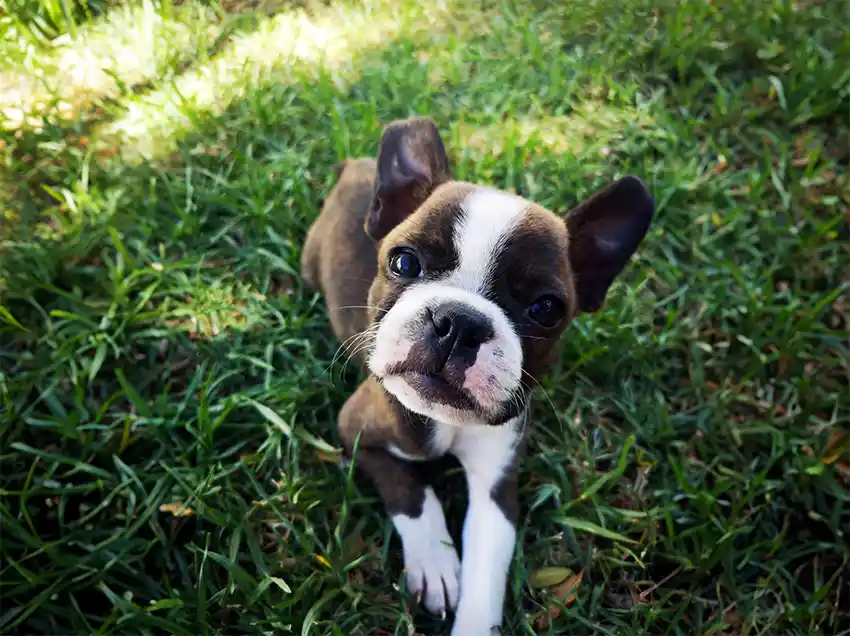
Some Things to Look for During a Dog or Puppy Selection
Most dogs will be good watchdogs in the appropriate circumstances, so be selective and avoid the obvious pit falls when selecting the dog with who you wish to share your life. However, we never recommend getting a dog as a watchdog because you really cannot expect your dog to bark at people at home and then not bark at people when out and about.
Although the Boston Terrier is generally a friendly, fun-loving breed, occasionally you will encounter that undesirable personality. So be selective and make sure you follow the Bark Busters’ check list on what to look for when selecting your new dog or puppy.
When searching for a dog or puppy be sure to check out your local animal shelter or rescue, even if you are looking for a puppy. Many of these dogs were surrendered just because of their over-exuberance and many had litters in the rescue.
Bringing a New Puppy Home
Always try to bring your new dog or puppy home early in the day. The reason behind this is that they will need time to become accustomed to their new home.
If you can bring something from their old home, like some bedding or a toy, this will help them to settle.
Ensure that you have pre-selected a designated area for your new dog or puppy, a place where they will rest and sleep, and then start to get them used to their new area. You can do this by feeding them in the new area during the day and spending time with them there. If you have selected a crate, place your dog in it well before bedtime, so you have time to see how they are going to react when you leave. Be sure to select a place for your dog to sleep that is practical. It should not be your bed unless you are determined to always have your dog sleep with you. Otherwise, you won’t break that habit easily.
If your dog or puppy begins barking or crying, don't rush back. That will only make the situation worse. Instead stay close by and address their concerns. This will calm them faster than rushing back each time they bark or cry out. If you rush back every time they cry or bark, they will soon believe that all they need to do is cry out and you will appear. Remember they did have a home before this one and they will need time to learn to adapt to their new home.
For Potential Dog Owners
- Boston Terriers have lovely, expressive eyes that require special attention. It is recommended to check them daily for signs of redness or irritation.
- Responsible breeders regularly screen their stock for other common issues, including deafness and patellar luxation.
- As a flat-faced breed, Boston Terriers may have breathing issues in extreme heat.
- Boston Terriers do well in cities; while they love activities, their compact size means they do not need a lot of space.
If you are thinking of purchasing a Boston Terrier, be sure to source from a responsible breeder who is breeding for not only looks, but health and temperament as well. Rescues are also great options for prospective Boston Terrier owners.
Like any breed, Boston Terriers benefit from early socialisation and basic obedience training to establish patterns of good behaviour.
We are always available to help you develop a consistent, compassionate approach to good behaviour for your Boston Terrier. Learn more about our services and schedule an appointment with one of our trainers today!
Four Basic Needs
Your dog has four basic needs in life to keep it happy healthy and content.
Let's examine those four basic needs and why your dog needs them to keep it healthy, balanced and content.
Food - diet / nutrition
We promote a diet that is grain free, low in carbohydrates and without any harmful e-numbers, colours and preservatives. Carbohydrates do add energy that the dog needs to burn off and can make an already hyperactive dog more active.
The right diet, grain free and filled with fruits, vegetables and raw meat will have advantages to how your dog will feel, look and act.
If you want to understand why grains can make a dog more energetic, you only need to think of racehorses and how their trainers give them grain to get highly energetic racehorses. Energy in, equals energy out.
Bark Busters dog trainers are not vets or dietitians, so we urge you to do your own research into the best diet for your dog. A diet that you will be comfortable with.
We do however have vast experience at how highly concentrated grain diets effect behaviour and can cause hyperactivity. This is very prominent in Japan, where most dogs are fed high levels of rice in their diet which can adversely affect concentration and focus.
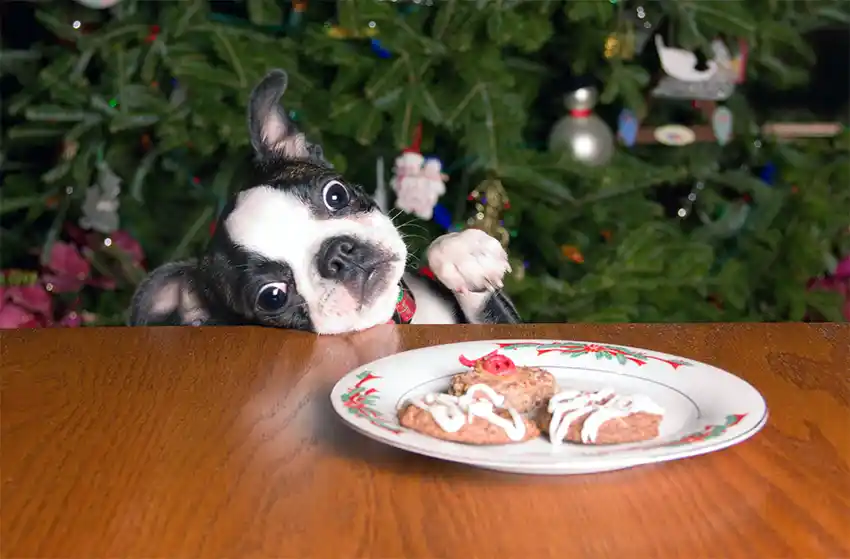
Safety - through leadership and education
All dogs need strong leadership and to know where they fit into the family unit. If they know they have a leader that will make all the decisions, one who is fair and just, they will be happy and content.
On the other hand, if they have no structure in their life, they have inconsistency, and don’t know how things will be from one day to the next, then they will become stressed and may experience health ailments, skin and stomach issues and behaviour problems. Routine and respect must be established. With equal doses of love and structure your will feel safe and secure.
Shelter - a place to call their own
Dogs love nothing better than to curl up on the couch or in a place they can call their own, even when there is more than one dog. Most dogs are very sociable, and they will think nothing of all snuggling in together. Provide your dog with its own "den", a place where they can call home, and somewhere they can go to for a bit of peace and quiet. Just make sure their "den" is warm, easy to clean and maintain.
Entertainment - toys and games
A very important part of your dog's four basic needs is their need to have something to do. If we want to avoid our pets becoming bored and destructive, then they need a way to fill their day.
Dogs thrive with physical and mental exercise. Dogs are highly intelligent animals, and they need to keep their brains active as much as their bodies. Entertainment is an important part of their well-being and essential to your dog's overall mental health.
One great toy is the Bark Busters GameChanger® which helps to prevent boredom, stress, and separation anxiety. By filling it with small treats, your dog will have plenty of fun trying to get the treats to dispense.
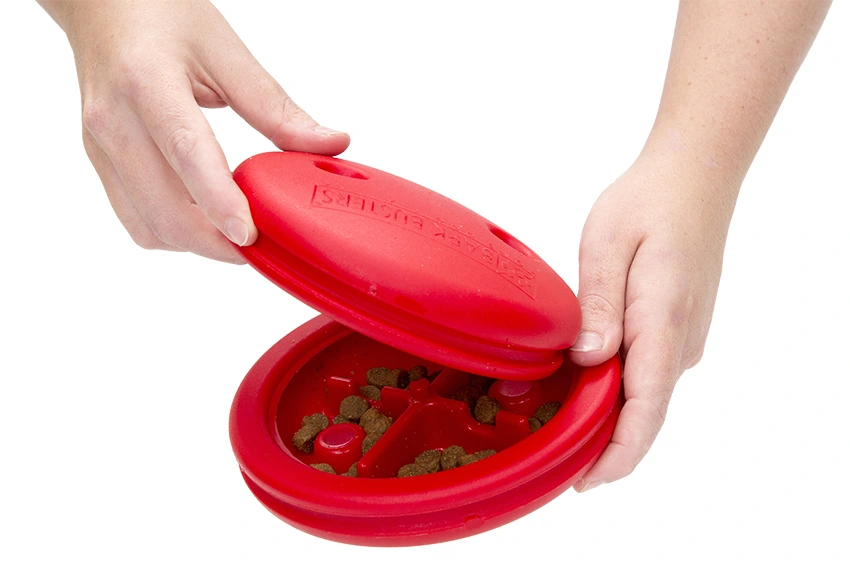
Games to Play
Try to play games that will enhance your dog’s behaviour, not increase its unwanted behaviour.
We recommend that you don't play wrestling, hand games or chasing games that encourage a dog to bite or run away. By playing these types of games you are teaching your dog bad habits, not good ones. These games encourage biting and running away, causing recall issues.
Tug of war games are fine as long as you control the game.
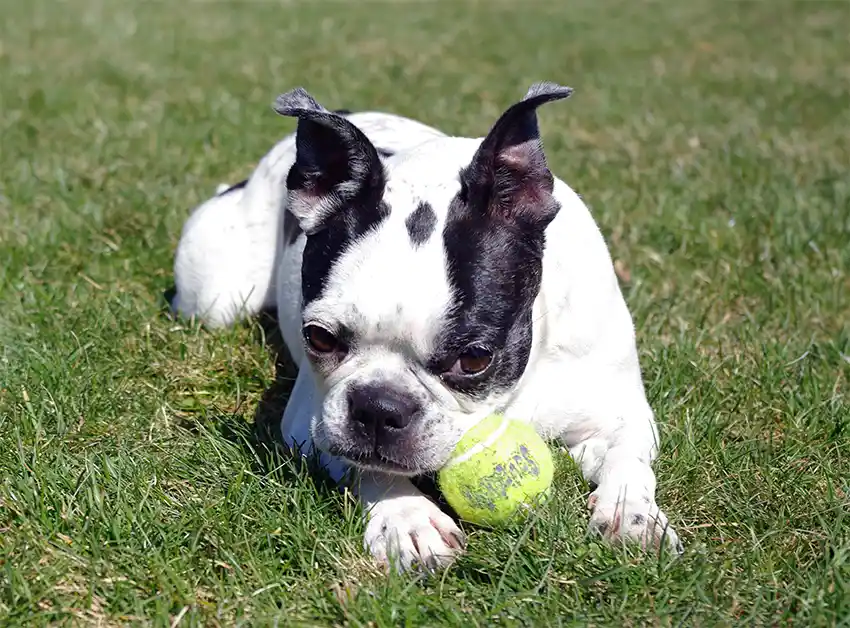
Child’s Play
Due to their size and energy levels, you must give thought to how your dog and children will interact. Any play between dog and children must be monitored and controlled at all times. Children have a way of getting dogs excited and this can lead to the dog inadvertently hurting the child through their natural excitable, boisterous behaviour.
Make sure that you educate the children to play sensibly and instruct them to play games that are less likely to lead to over-exuberance, such as hide and seek games or fetch games, not the rough and tumble type of games.
Wrestling with a dog will cause over-excitement and to play-bite every time it sees the children, eventually causing your children to try to avoid the dog, because they fear getting hurt.
Adult Play
Any form of play by the adults in the house should be measured and not aimed at over-exciting your dog. When you do play, play games like fetch the ball and tug-of-war games and make sure the game ends with you taking control of the item. Once the game is over, take the item out of play, with a 'Finish' command and lots of praise.
In controlling the game and the item we show our dogs, in a subtle way, that you are the decision maker and that you control the game.
It is best not to play rough and tumble or play games where you thrust your hands into your dog’s mouth. These types of games only teach dogs to bite your hand. This can lead to a situation where your dog will bite your hand anytime it comes close to you.
Dog Parks
Taking Your Boston Terrier to Dog Parks
Dog Parks are one of the most misunderstood dog activities of the modern-day dog world. Some doggie parents love nothing more than to take their dog to a dog park. They have been told they need to socialise their dog and so off they go.
They love the fact that their dog has fun, they get to meet other dog lovers and watch the dog's romp around and play.
That is the upside, but the downside is there are those dog lovers whose dogs don't fit into this world at all. They are those dogs or puppies that were bullied, frightened on their first visit or whose personality does not fit the mould.
These folks agonise over the fact that their dog or puppy does not look forward to its trip there, it hides under the seat of the car, or it has to be carried or enticed into the park.
Many ask us why their dog acts like this and how they can fix it?
Bark Busters do have ways to assist these pet parents, but we do also explain why their dog might not like the dog park because of its personality.
It reminds us of a friend of ours who visited us regularly with her little dog, 'Harry'.
When they would arrive, Harry would walk up to each of us, sniff our legs and walk away.
She questioned us one day on why we never petted Harry when he came up to us.
We explained that this was not what Harry was doing, he was sniffing us, not requesting a pat. If he had been requesting to be petted, after sniffing us, he would have gestured to us to pet him. He did not do that, instead he walked away.
We told her that Harry was not a social dog and preferred not to be touched by anyone other than her and he avoided any interaction with our dogs too. He was a 'one person' dog that did not feel comfortable around others.
It was like a light had been turned on, our friend smiled and told us that this explained a lot to her. She further explained that every time she took Harry to the dog park, that he could not wait to get back to the car when it was time to leave, that he would stand away from the other dogs, never join in the play and snap at other dogs when they came near him.
He was telling her in every way he could that he did not fit into that dog park crowd, just like some humans hate parties!
Bark Busters Lifetime Support Guarantee
Bark Busters dog behaviour therapists and trainers have trained more than 1 Million dogs worldwide and are renowned authorities in addressing dog behaviour with all-natural, dog-friendly methods. The Bark Busters training is the only service of its kind to provide International dog training guaranteed lifetime support. With hundreds of trainers around the world, Bark Busters continues its mission to enhance the human/canine relationship and to reduce the possibility of maltreatment, abandonment and euthanasia. Contact your local Bark Busters dog trainer to see how they can help.
This article is the copyright of Bark Busters® and is intended for information purposes only. Dog owners should fully research any problems that they may have with their dogs.

